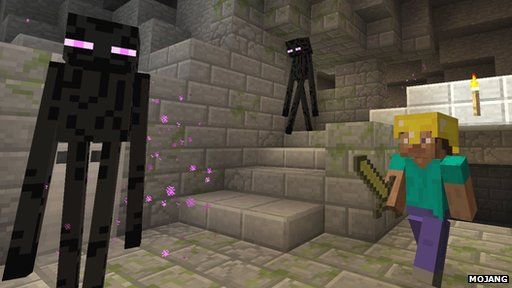Minecraft and Microsoft: What now?
- Published

If you want to understand why Minecraft-maker Mojang is being bought by Microsoft, just play the game.
The single-player version is about a lone individual surviving in a harsh world with only their ingenuity to keep them safe. Their very survival depends on them building a home and battling monsters employing only tools and weapons they make with their hands.
If computer games were subject to the same analysis applied to novels it would be easy to read this as a metaphor for the life of Markus "Notch" Persson, the game's creator. He's talked in the past about growing up "relatively poor", about making his own entertainment, and about whether he will have to conquer the same "demons" that troubled his father.
Family, friends and the success of the things Notch made with his hands helped him prosper in this harsh world, but that success has led to other challenges. And ones that are much harder to conquer.
Just what had changed was evident at Minecon in 2012 where it was impossible for Notch to walk more than a few feet before he was grabbed by yet another fan keen to shake his hand, slap him on the back, take a photo or get him to sign their foam sword.
People power
This transformation from humble programmer responsible only for his own code to the leader of a global movement was one he was never happy with. His heartfelt explanation of why he is leaving Mojang - "it's about my sanity" - underscores that.
Markus Persson speaking in 2012: "Minecraft is about being part of a world and changing it to make it your own"
He knows that Minecraft is now about overseeing a community - much, much more than it is about maintaining and developing a codebase.
And therein lies the potential problem for Microsoft.
With Xbox Live and its other cloud services there is no doubt that it has solid experience of running a massive computer infrastructure that serves millions of paying customers. That will be vital when it starts running the behind-the-scenes systems that keep Minecraft going.
But Microsoft will alienate that community if it does not realise how personal the game is, not just for Notch, but for many of the people who play it. It's where they meet their friends and make new ones, where they express themselves, where they show off their technical and creative prowess, where they find themselves.
I have seen that with my own children who play it in very different ways. One is a big fan of modified versions that involve arena battles or capture-the-flag-type competitions. The other spends hours crafting intricate homes built around swooping minecart tracks. Sometimes he builds treehouses that span forests. They also regularly go adventuring with their friends seeking treasure, avoiding creepers, and battling spiders, zombies and skeletons.
They, and millions like them, can only do this because of the freedom and openness of Minecraft. The malleability of the game lets them change it to suit their mood. It does this by giving people a degree of access that Microsoft, in its business software, has never embraced. And that is what has got the millions who play Minecraft worried. Those fans do not want Microsoft to mess with their freedom to tinker with it as they please. They have a deep-rooted sense of ownership about the things they create in the game.
There's no doubt that will be a tricky job for Microsoft to achieve given how critical that community can be.
It will have to work hard to battle those sworn enemies of every online gamer - downtime and lag (aka delay). It is likely that any problem with the game's availability in the future will be blamed on Microsoft - whether it is the company's fault or not.
Making more drastic changes to the running of the game such as limiting how people can modify it, charging them for things that are currently free or imposing restrictions on how they can tell the world about what they have done, might, if handled poorly, turn a big chunk of that community against Microsoft.
That would be bad, given that many of its players are now children who will grow up to be the gamers of the future. No doubt Microsoft is hoping to impress them with the way it handles Minecraft. If it gets it wrong, it could end up being one of the monsters that people want to take on and slay.
- Published15 September 2014
- Published15 September 2014
- Published15 September 2014
- Published7 May 2014
- Published7 September 2013